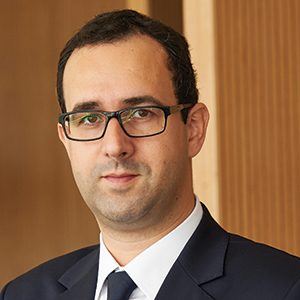1. What is your experience in banking and finance law in Portugal, and can you provide examples of cases or transactions you’ve handled?
The banking and finance team of CTSU, a Deloitte Legal Practice in Portugal, has extensive experience in supporting clients with transactions and to advise on governance and regulatory changes to their activity and internal organisation.
Recently, we have been particularly focused in structuring investment funds, namely through the conversion of real estate commercial companies into regulated AIFs for real estate investment, in the sale and purchase of PL and NPL portfolios, in financings and associated collaterals, as well as in the support to the acquisition, setting up, winding up and registering of credit institutions, financial companies and insurance companies.
We are very active in digital transformation projects, cross-border and passporting of financial services and products into the Portuguese market and on the development of digital products in the banking, insurance and financial sectors.
Moreover, we have a proven track-record in the implementation of compliance programmes and on cross-border restructuring projects for financial entities, working in close coordination with clients and their advisors.
2. Can you explain the regulatory framework for banking and financial institutions in Portugal, including recent changes that may impact my situation?
In short, the main pieces of local legislation for financial institutions in Portugal can be divided into:
I. The credit institutions and financial companies general regime, approved by Decree-Law no. 298/92, that regulates the banking sector and some financial services such as factoring companies or foreign currencies exchange companies.
II. The Portuguese Securities Code, approved by Decree-Law no. 486/99, that regulates the securities market and financial instruments and transposes MiFID II into national law.
III. The asset management regime, which was recently approved by Decree-Law no. 27/2023, regulates investment funds and venture capital and transposed UCITS and AIFMD Directives to Portuguese law.
Moreover, there are specific pieces of legislation governing some products and services such as consumer credit, payment services and electronic money, distance financial services contracts, financial leasing, insurance and pension funds.
These regimes are complemented by European regulation, technical standards and guidelines and by local regulation from the national supervisory authorities, namely the Bank of Portugal, for the banking sector, the CMVM, for capital markets, investment services and investment funds, and ASF, for insurance and pension funds.
3. What types of financial services and products are commonly regulated in Portugal?
The financial services sector is highly regulated and the majority of banking and financial products in Portugal have to comply with a wide range of European and local legislation and regulation enacted by local supervision authorities.
For example, investment and venture capital funds are supervised by the CMVM. The legal framework was recently updated in Portugal with the entering into force of the new asset management regime, which transposes to national law the UCITS and AIFMD Directives and set forth several simplification measures in comparation with the previous asset management legal framework, including the introduction of an ex post supervision approach to the majority of authorisation and registry procedures.
4. How can you assist me in structuring financial transactions or investments to ensure compliance with Portuguese laws and regulations?
We can assist clients in licensing with local regulators, financing and in the setting up of investment structures through investment funds. Our support includes covering all regulatory matters in relation to your financial transactions.
Our advice is integrated with the other areas of practice of the firm, in particular tax, corporate, mergers and acquisitions, real estate, litigation, and digital and TMT, to act on strategic deals where banking and finance law is a key element.
Our team has also been active in supporting transactions and investments relating to the technological revolution of the financial sector: fintech companies, crypto assets, neo banks and the use of the EU financial passport mechanism for online cross-border banking and investment services, among others.
We work together with other Deloitte Legal practices both to address specific legal needs of clients which operate or intend to start their activity in Portugal and in the assistance of multidisciplinary projects which involve several jurisdictions.
5. Can you provide guidance on the tax implications of banking and finance transactions in Portugal, and help me optimise my tax position?
Yes, we count with tax experts that have are specialised in tax implication analysis of banking and finance transactions in Portugal and also with an experienced tax litigation team.
6. In the event of a dispute or litigation related to banking or finance matters, how experienced are you in representing clients in Portuguese courts or alternative dispute resolution mechanisms?
We have an experienced litigation team that covers tax controversy issues, insolvency and credit recoveries on a regular basis to clients in the banking and financial sector.
Our tax team, which has relevant experience in banking and finance (CIT, VAT, etc.), has been assisting several clients regarding tax litigation, in the context of arbitral claims, which ended with a favourable decision.
As an example, we highlight the additional contribution on the banking sector, which was created in order to face the Covid-19 pandemic situation and to finance the social security fund. However, the recent arbitral court’s rulings declared that this contribution violates the Portuguese Constitution, namely the equality and the contributive capacity principles.
Our tax litigation team has also been assisting several clients regarding the standard contribution on the banking sector, with some favourable decisions as well.
7. What are the key considerations and legal requirements for international businesses or individuals looking to establish banking or financial operations in Portugal?
The structuring of operations in Portugal can take different paths. There are several players in the Portuguese market that have established branches in Portugal. In the case of institutions authorised in other EU member states, it is also viable to operate on a cross-border basis on a non-continuous basis and without a physical presence in Portugal through the freedom to provide services regime (‘FPS’).
Both options have its pros and cons but can be considered a more flexible solution for the establishment of operations in Portugal. In the case of FPS, as a general rule the legislation from the Home Country applies, although Portuguese public interest rules must be followed.
On the other hand, depending on the activity, a bank or financial company can also be established in Portugal through a prior authorisation and/or register procedure with the supervisor. These are granted on a case by case basis by the relevant regulator, which in the case of credit institutions, financial companies, payment and e-money institutions is the Bank of Portugal (when applicable, in cooperation with the European Central Bank, within the framework of the single supervision mechanism).
For example, the legal requirements and the key elements that should be taken into consideration in the filing of an authorisation request for a credit institution before the Bank of Portugal are listed in the credit institutions and financial companies general regime. These include the type of entity, a programme of operations, identity of shareholders and of the members of the management and supervisory bodies, explanation on the adequacy of the shareholder structure, governance arrangements, risk management and internal control system, remuneration policy, among others.
The acquisition or increase of qualified holdings in existing financial institutions is also an option to establish banking or financial operations in Portugal.
8. What is the process for obtaining necessary licenses and approvals for financial activities in Portugal, and how long does it typically take?
Timings and process can vary depending on the type of entity and financial activities being carried out. Please refer to the previous questions regarding the process for obtaining the necessary licenses and approvals for institutions subject to the Bank of Portugal. In the case of a prior authorisation for a banking license, the applicants must be notified of the decision within six months of the application being deemed complete, but in any case no longer than 12 months after the initial receipt of the application by the regulator.
9. How do you stay updated on changes in Portuguese banking and finance law, and how will you keep me informed of relevant developments affecting my interests?
We provide daily information to clients on new legislation and regulation that could affect the banking and financial sector through legal alerts, newsletters and as a service through an online tool.
Additionally, in some cases we can provide benchmarks on regulatory topics and of market trends (eg buy now pay later) prepared together with the Deloitte Legal network. Moreover, within the Deloitte Legal network we participate in group discussions to keep track of new legislation being prepared at the European level (eg MiFID III, PSD III, AIFMD II) and to assess potential impacts of new European legislation to our clients.
10. How can you provide legal support to multinational financial institutions with a presence in Portugal?
CTSU’s banking and finance team has an extensive track record in cross-border operations and in the restructuring of financial groups with a presence in Portugal.
Moreover, within the Deloitte Legal network, we have been working alongside with colleagues of different countries whenever the needs of the client entail several jurisdictions.
For more information contact

Miguel Silva Cordeiro, Partner and head of banking and finance
E: mcordeiro@ctsu.pt

Elisa Seara Vaz, Principal associate, banking and finance
E: elvaz@ctsu.pt

Tomás Gonçalves da Costa, Managing associate
E: tcosta@ctsu.pt














